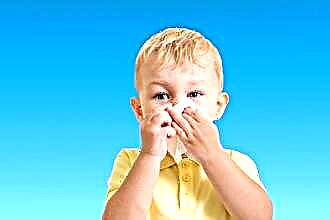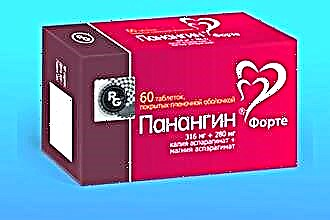When a child's severe coughing comes to vomiting, many mothers are lost and do not know what to do. First of all, don't panic. We need to find out the reason why the baby began to cough. Perhaps it is not infectious and it will be possible to cope with the problem at home. However, the first step is to stop the vomiting cough and calm the child down.
Cough before vomiting in infants
 A cough before vomiting in a child under one year old is much more common than in older children. The main reason is that in a brain that is still small in volume, the cough and vomiting centers are located in close proximity. And with any strong irritation of the cough, nerve impulses reach the emetic, causing a response reflex reaction of the body.
A cough before vomiting in a child under one year old is much more common than in older children. The main reason is that in a brain that is still small in volume, the cough and vomiting centers are located in close proximity. And with any strong irritation of the cough, nerve impulses reach the emetic, causing a response reflex reaction of the body.
The second reason why a cough with vomiting in an infant may be accompanied is the swallowing of air due to improper feeding. A healthy child simply regurgitates this air after a while. But if the larynx is irritated, then the ingress of food debris into it, which already contains acidic gastric juice, provokes a cough. And if the baby coughs heavily, even on a full stomach, then the gag reflex will work at the same time.
Fortunately, these are purely physiological reasons and should not cause much concern to parents. You just need to make sure that the baby grips the nipple or nipple well during feeding, and also regularly clean his nose so that he can breathe normally and does not swallow air with food.
But a dry cough before vomiting in older babies can be caused by more serious reasons, which cannot be ignored.
Causes
 Usually, vomiting is accompanied by a strong dry cough, in which sputum does not go away. Such a cough in itself is a very unpleasant and bad symptom. Most often, it indicates irritation and / or inflammation of the larynx. But wet, too, can sometimes be so strong that it touches the vomiting center. There are various reasons for coughing up to vomiting, but the most common ones are:
Usually, vomiting is accompanied by a strong dry cough, in which sputum does not go away. Such a cough in itself is a very unpleasant and bad symptom. Most often, it indicates irritation and / or inflammation of the larynx. But wet, too, can sometimes be so strong that it touches the vomiting center. There are various reasons for coughing up to vomiting, but the most common ones are:
- Dry or hot air. It is logical that dry air causes a dry cough - it leads to dehydration of the mucous membranes and the formation of crusts in the nose and sore throat. Most often, children start coughing during the heating season. Moms blame the cough for a virus, but in fact the reason is banal - working heating devices. It is enough to put on a humidifier and even just hang a damp towel on the battery - and the cough disappears very quickly.
- Colds and hypothermia. It causes vasoconstriction and spasms, accompanied by chills, weakness and a hacking dry cough. After a few hours, the body temperature usually rises, and clear liquid snot flows from the nose. If hypothermia was severe, the disease develops quickly, and the cough is paroxysmal. It is very important here not to waste time and start home treatment right away.
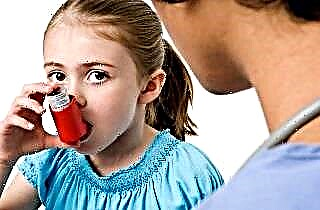 Mucus flowing down the throat. This happens with severe rhinitis or sinusitis. If the nose is stuffy and the snot does not find a way out, then they accumulate in the nasal passages, and the excess flows down the back wall of the larynx, greatly irritating it. Adults and children after about 6 years of age swallow them. And babies still cannot do it and try to get rid of mucus with a cough. With a strong cough or a lot of snot, vomiting occurs.
Mucus flowing down the throat. This happens with severe rhinitis or sinusitis. If the nose is stuffy and the snot does not find a way out, then they accumulate in the nasal passages, and the excess flows down the back wall of the larynx, greatly irritating it. Adults and children after about 6 years of age swallow them. And babies still cannot do it and try to get rid of mucus with a cough. With a strong cough or a lot of snot, vomiting occurs.- Bronchial asthma. This cough is easy to recognize by its paroxysmal nature and signs of suffocation in a child. It is caused by a spasm of the smooth muscles of the bronchi, due to which the lumen of the larynx closes, and almost no air enters the lungs. A strong cough is a reflex attempt by the body to open the larynx. Asthma attacks usually occur at night and quickly resolve after using an inhaler with a special drug.
- Allergy. Severe allergic reactions are always accompanied by swelling. In young children, the larynx is narrow, and even a slight swelling causes a feeling of suffocation and a violent cough. The picture is complemented by transparent snot, red inflamed eyes, and skin reactions are also possible. If the allergen is not removed or the medication is not taken, this cough can last for a long time.
- Reflux disease. It is the cause of the appearance of a cough caused by irritation of the larynx and esophagus due to the throwing of stomach contents into it. This cough is not accompanied by fever and other common cold symptoms. Most often, attacks occur at night when the body is in a horizontal position. To stop coughing, all you need to do is raise the pillow higher and give your child a warm drink.
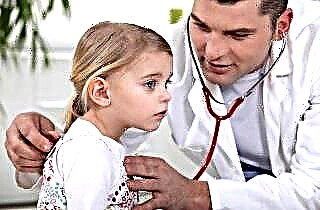 Infectious diseases. Measles, whooping cough, croup, or complications from acute respiratory viral infections (bronchitis and pneumonia) are also accompanied by severe coughing and frequent vomiting. You can recognize the presence of an infection in the body by the accompanying symptoms: increased body temperature, thick yellow or green snot, weakness and loss of appetite in a child. When listening, you hear wheezing or whistling characteristic of the disease. Home treatment without the supervision of a doctor in this case can complicate the course of the disease and translate it into a chronic form.
Infectious diseases. Measles, whooping cough, croup, or complications from acute respiratory viral infections (bronchitis and pneumonia) are also accompanied by severe coughing and frequent vomiting. You can recognize the presence of an infection in the body by the accompanying symptoms: increased body temperature, thick yellow or green snot, weakness and loss of appetite in a child. When listening, you hear wheezing or whistling characteristic of the disease. Home treatment without the supervision of a doctor in this case can complicate the course of the disease and translate it into a chronic form.
The most unpleasant and terrible reason that can cause a dry cough with vomiting is neoplasms that have appeared in the lungs. You can suspect something was wrong if the cough is persistent and gets worse over time, despite treatment. The child weakens, appetite disappears, immunity drops sharply, and traces of blood appear in the transparent, occasionally coughing up sputum. The standard course of therapy in this case will not help, and the earlier the disease is detected, the higher the chances of recovery.
Quickly relieve an attack
 Violent coughing up to vomiting, especially at night, frightens and exhausts the child. Therefore, before starting treatment and even looking for its causes, everything must be done to stop the attack and calm the baby.
Violent coughing up to vomiting, especially at night, frightens and exhausts the child. Therefore, before starting treatment and even looking for its causes, everything must be done to stop the attack and calm the baby.
First you need to sit him in bed with pillows under the back. When the vomiting stops, you need to rinse your mouth with warm water, and then begin to fight the cough. This can be done fairly quickly with simple folk remedies:
- Warm drink. Washes away mucus, warms up the throat, moisturizes the larynx, relieves pain and spasms. Even heated clean water will do, but it is better if you have herbal tea made from chamomile, sage, raspberry or currant leaves, and a rosehip decoction.
- Warm milk. A reliable way to quickly remove even a very strong cough. It coats the mucous membranes of the inflamed larynx, moisturizes them and helps to neutralize toxins. You can add a teaspoon of honey and / or ghee to milk. It should be pleasantly warm. Drink slowly, in small sips, and then rest your throat.
- Antihistamines. They help to get rid of not only allergic cough. They reduce sputum production, quickly relieve swelling and bronchospasm, and have a mild sedative effect. For small children, it is very convenient to use "Diazolin" in syrup.
- Antitussives. They must be used with caution. If a strong cough is caused by a large accumulation of mucus, or the child is taking expectorant drugs, antitussives should not be used. But with a dry, unproductive barking cough, it helps a lot. The child can be given "Stopussin", "Sinekod", "Codelac" and other syrups.
 Inhalation. Steam inhalation quickly enough copes with attacks of dry cough. It moisturizes the mucous membranes well and expands the bronchi, making breathing easier.But when the child is small, you need to be sure that there is no accumulated mucus in the throat, which can swell from the steam and block the larynx. It is better to do inhalation after the baby drinks warm water and flushes off the mucus. A solution of baking soda, a decoction of chamomile or sage, a few drops of essential oil (eucalyptus, thyme, lavender) or a piece of Star balm thrown into water will do.
Inhalation. Steam inhalation quickly enough copes with attacks of dry cough. It moisturizes the mucous membranes well and expands the bronchi, making breathing easier.But when the child is small, you need to be sure that there is no accumulated mucus in the throat, which can swell from the steam and block the larynx. It is better to do inhalation after the baby drinks warm water and flushes off the mucus. A solution of baking soda, a decoction of chamomile or sage, a few drops of essential oil (eucalyptus, thyme, lavender) or a piece of Star balm thrown into water will do.- Oil burner. An excellent tool for simultaneously cleaning the room from viruses and bacteria. You can use ready-made oil mixtures, which are sold in pharmacies, or separately. Any oils of coniferous plants, tea tree or lavender are excellent for these purposes. If there is no aroma lamp in the house, you can put a few drops on a cotton cloth and put it in the bed (not on the pillow!). The coughing fit will not recur.
It is better not to give expectorants with a strong cough before vomiting - they can increase the discharge of sputum and provoke a new attack of coughing. If such attacks are repeated, you should consult your doctor. And if this happened for the first time, and there is no high temperature yet, then you can treat the baby with folk remedies.
Home treatment
 It is possible to treat a child at home with folk remedies only when the disease is at an early stage or the causes of the cough are non-infectious. They help well to remove inflammation of the mucous membranes and cough: black radish juice with honey, aloe with honey, burnt sugar, warm milk.
It is possible to treat a child at home with folk remedies only when the disease is at an early stage or the causes of the cough are non-infectious. They help well to remove inflammation of the mucous membranes and cough: black radish juice with honey, aloe with honey, burnt sugar, warm milk.
In general, for any cough, a warm drink is the first remedy. It relieves cough and saves the body from dehydration, which occurs especially quickly in children with vomiting or fever.
Warm herbal tea can be given to your child up to 5-6 times a day, 20-30 minutes before or after meals. Warm milk is enough 2-3 times a day.
Remember that milk is food, not water, so its amount must be taken into account when compiling a daily diet. And it often happens like this: mothers complain to the doctor that the baby has stopped eating, and then it turns out that she is reinforced "soldering" him with milk and honey. What kind of appetite is there with such treatment ?!
Herbal expectorant syrups "Herbion", "Lazolvan", "Mukaltin", "Ambroxol" and others are useful for a wet cough. They can be used without a doctor's prescription, especially since they help to restore irritated mucous membranes. The main thing is not to exceed the dosage of the drug indicated in the instructions.
Anti-inflammatories can be used if there is visible redness in the throat or back of the larynx. They cope well with not too high temperatures. "Paracetamol", "Ibuprofen", "Aspirin" are good helpers at the first stage of colds or infectious diseases.
 Antipyretic drugs are not worth getting carried away with. Yes, they should always be at hand in case of very high temperatures. But remember that pathogenic microflora dies only at 38 degrees and above, which means that such a temperature is useful - this is a protective reaction of the body. And if you bring down the temperature too early, then the remaining microbes will have to be killed with antibiotics, which is not the best option for a child.
Antipyretic drugs are not worth getting carried away with. Yes, they should always be at hand in case of very high temperatures. But remember that pathogenic microflora dies only at 38 degrees and above, which means that such a temperature is useful - this is a protective reaction of the body. And if you bring down the temperature too early, then the remaining microbes will have to be killed with antibiotics, which is not the best option for a child.
It is imperative to consult a doctor if:
- body temperature rose sharply and strongly (above 38.5);
- blood appears in sputum, vomit, or snot;
- attacks of severe coughing are repeated more and more often;
- during an attack, signs of suffocation and oxygen starvation are noticeable;
- the child completely refuses to eat;
- vomiting occurs with any food or drink;
- there is thick yellow, green or orange sputum.
These symptoms may indicate the onset of life-threatening diseases for the child: pneumonia, diphtheria, scarlet fever, whooping cough. Their treatment with home methods is ineffective, and often hospitalization is necessary with such diagnoses.
Care and regimen
Of course, a sick child requires additional careful care. But here, too, one must not overdo it.
What should not be done in any case is:
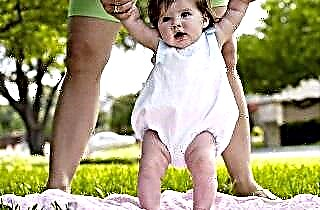 Force-feeding the baby - when he recovers, he will ask for food himself, but for now all the strength is spent on fighting the disease, so warm milk or liquid cereals are enough.
Force-feeding the baby - when he recovers, he will ask for food himself, but for now all the strength is spent on fighting the disease, so warm milk or liquid cereals are enough.- It is too warm to wrap him up, especially at temperatures - on the contrary, the clothes should be such that he does not overheat even more, and when the baby begins to sweat actively, be sure to change him into dry clothes, wiping off the sweat with a napkin moistened with water.
- Refusing to bathe (if the body temperature is below 37.2) is a great way to warm up the entire body of the child, wash off the toxins released from sweat and warm the upper respiratory tract with steam. You can add a decoction of herbs or a few drops of essential oils to the bath.
- Canceling walks in good weather - yes, damp cold air will not benefit, but if the sun is outside, even in winter, and the baby does not have a fever, then fresh air will provide the body with oxygen, sunlight will kill germs, and a walk will cheer up the baby.
The child's room should be light and clean, it should be ventilated at least twice a day, and even better before every daytime sleep. Do wet cleaning daily. Provide adequate nutrition and the correct daily regimen. Limit too noisy and active games. With proper treatment and following these simple measures, the baby will recover very quickly.

 Mucus flowing down the throat. This happens with severe rhinitis or sinusitis. If the nose is stuffy and the snot does not find a way out, then they accumulate in the nasal passages, and the excess flows down the back wall of the larynx, greatly irritating it. Adults and children after about 6 years of age swallow them. And babies still cannot do it and try to get rid of mucus with a cough. With a strong cough or a lot of snot, vomiting occurs.
Mucus flowing down the throat. This happens with severe rhinitis or sinusitis. If the nose is stuffy and the snot does not find a way out, then they accumulate in the nasal passages, and the excess flows down the back wall of the larynx, greatly irritating it. Adults and children after about 6 years of age swallow them. And babies still cannot do it and try to get rid of mucus with a cough. With a strong cough or a lot of snot, vomiting occurs. Infectious diseases. Measles, whooping cough, croup, or complications from acute respiratory viral infections (bronchitis and pneumonia) are also accompanied by severe coughing and frequent vomiting. You can recognize the presence of an infection in the body by the accompanying symptoms: increased body temperature, thick yellow or green snot, weakness and loss of appetite in a child. When listening, you hear wheezing or whistling characteristic of the disease. Home treatment without the supervision of a doctor in this case can complicate the course of the disease and translate it into a chronic form.
Infectious diseases. Measles, whooping cough, croup, or complications from acute respiratory viral infections (bronchitis and pneumonia) are also accompanied by severe coughing and frequent vomiting. You can recognize the presence of an infection in the body by the accompanying symptoms: increased body temperature, thick yellow or green snot, weakness and loss of appetite in a child. When listening, you hear wheezing or whistling characteristic of the disease. Home treatment without the supervision of a doctor in this case can complicate the course of the disease and translate it into a chronic form. Inhalation. Steam inhalation quickly enough copes with attacks of dry cough. It moisturizes the mucous membranes well and expands the bronchi, making breathing easier.But when the child is small, you need to be sure that there is no accumulated mucus in the throat, which can swell from the steam and block the larynx. It is better to do inhalation after the baby drinks warm water and flushes off the mucus. A solution of baking soda, a decoction of chamomile or sage, a few drops of essential oil (eucalyptus, thyme, lavender) or a piece of Star balm thrown into water will do.
Inhalation. Steam inhalation quickly enough copes with attacks of dry cough. It moisturizes the mucous membranes well and expands the bronchi, making breathing easier.But when the child is small, you need to be sure that there is no accumulated mucus in the throat, which can swell from the steam and block the larynx. It is better to do inhalation after the baby drinks warm water and flushes off the mucus. A solution of baking soda, a decoction of chamomile or sage, a few drops of essential oil (eucalyptus, thyme, lavender) or a piece of Star balm thrown into water will do. Force-feeding the baby - when he recovers, he will ask for food himself, but for now all the strength is spent on fighting the disease, so warm milk or liquid cereals are enough.
Force-feeding the baby - when he recovers, he will ask for food himself, but for now all the strength is spent on fighting the disease, so warm milk or liquid cereals are enough.